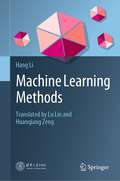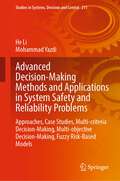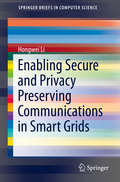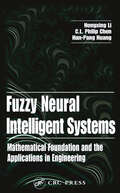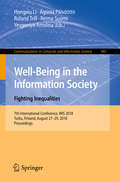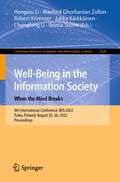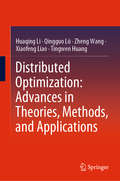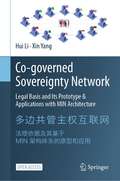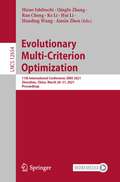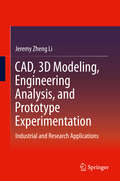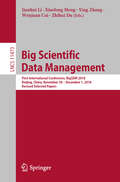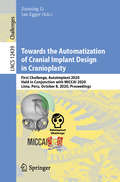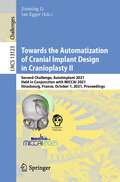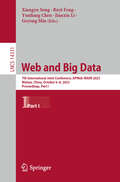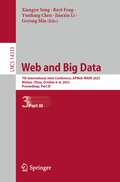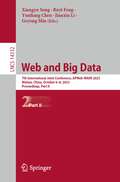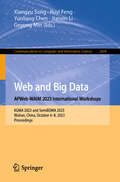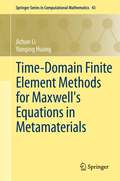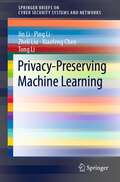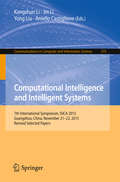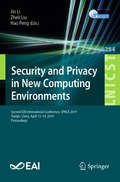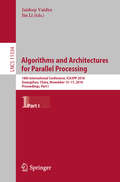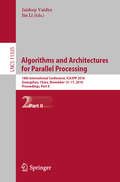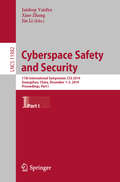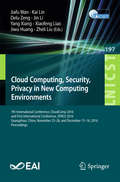- Table View
- List View
Machine Learning Methods
by Hang LiThis book provides a comprehensive and systematic introduction to the principal machine learning methods, covering both supervised and unsupervised learning methods. It discusses essential methods of classification and regression in supervised learning, such as decision trees, perceptrons, support vector machines, maximum entropy models, logistic regression models and multiclass classification, as well as methods applied in supervised learning, like the hidden Markov model and conditional random fields. In the context of unsupervised learning, it examines clustering and other problems as well as methods such as singular value decomposition, principal component analysis and latent semantic analysis. As a fundamental book on machine learning, it addresses the needs of researchers and students who apply machine learning as an important tool in their research, especially those in fields such as information retrieval, natural language processing and text data mining. In order to understand the concepts and methods discussed, readers are expected to have an elementary knowledge of advanced mathematics, linear algebra and probability statistics. The detailed explanations of basic principles, underlying concepts and algorithms enable readers to grasp basic techniques, while the rigorous mathematical derivations and specific examples included offer valuable insights into machine learning.
Advanced Decision-Making Methods and Applications in System Safety and Reliability Problems: Approaches, Case Studies, Multi-criteria Decision-Making, Multi-objective Decision-Making, Fuzzy Risk-Based Models (Studies in Systems, Decision and Control #211)
by He Li Mohammad YazdiThis book reviews and presents several approaches to advanced decision-making models for safety and risk assessment. Each introduced model provides case studies indicating a high level of efficiency, robustness, and applicability, which allow readers to utilize them in their understudy risk-based assessment applications. The book begins by introducing a novel dynamic DEMATEL for improving safety management systems. It then progresses logically, dedicating a chapter to each approach, including advanced FMEA with probabilistic linguistic preference relations, Bayesian Network approach and interval type-2 fuzzy set, advanced TOPSIS with spherical fuzzy set, and advanced BWM with neutrosophic fuzzy set and evidence theory. This book will be of interest to professionals and researchers working in the field of system safety and reliability and postgraduate and undergraduate students studying applications of decision-making tools and expert systems.
Enabling Secure and Privacy Preserving Communications in Smart Grids
by Hongwei LiThis brief focuses on the current research on security and privacy preservation in smart grids. Along with a review of the existing works, this brief includes fundamental system models, possible frameworks, useful performance, and future research directions. It explores privacy preservation demand response with adaptive key evolution, secure and efficient Merkle tree based authentication, and fine-grained keywords comparison in the smart grid auction market. By examining the current and potential security and privacy threats, the author equips readers to understand the developing issues in smart grids. The brief is designed for researchers and professionals working with computer communication networks and smart grids. Graduate students interested in networks and communication engineering will also find the brief an essential resource.
Fuzzy Neural Intelligent Systems: Mathematical Foundation and the Applications in Engineering
by Hongxing Li C.L. Philip Chen Han-Pang HuangAlthough fuzzy systems and neural networks are central to the field of soft computing, most research work has focused on the development of the theories, algorithms, and designs of systems for specific applications. There has been little theoretical support for fuzzy neural systems, especially their mathematical foundations. Fuzzy Neural Intelligent Systems fills this gap. It develops a mathematical basis for fuzzy neural networks, offers a better way of combining fuzzy logic systems with neural networks, and explores some of their engineering applications. Dividing their focus into three main areas of interest, the authors give a systematic, comprehensive treatment of the relevant concepts and modern practical applications:Fundamental concepts and theories for fuzzy systems and neural networks.Foundation for fuzzy neural networks and important related topicsCase examples for neuro-fuzzy systems, fuzzy systems, neural network systems, and fuzzy-neural systemsSuitable for self-study, as a reference, and ideal as a textbook, Fuzzy Neural Intelligent Systems is accessible to students with a basic background in linear algebra and engineering mathematics. Mastering the material in this textbook will prepare students to better understand, design, and implement fuzzy neural systems, develop new applications, and further advance the field.
Well-Being in the Information Society. Fighting Inequalities: 7th International Conference, WIS 2018, Turku, Finland, August 27-29, 2018, Proceedings (Communications in Computer and Information Science #907)
by Hongxiu Li Ágústa Pálsdóttir Roland Trill Reima Suomi Yevgeniya AmelinaThis book constitutes the refereed proceedings of the 7th International Conference on Well-Being in the Information Society, WIS 2018, held in Turku, Finland, in August 2018.The 19 revised full papers presented were carefully reviewed and selected from 42 submissions. With the core topic "Fighting Inequalities" WIS 2018 focused on innovations and fresh ideas in the cross-section of information society and health as understood in a wide sense. The papers presented in this volume are organized along the following broad topics: digital society and e-health.
Well-Being in the Information Society: 9th International Conference, WIS 2022, Turku, Finland, August 25–26, 2022, Proceedings (Communications in Computer and Information Science #1626)
by Hongxiu Li Maehed Ghorbanian Zolbin Robert Krimmer Jukka Kärkkäinen Chenglong Li Reima SuomiThis book constitutes the refereed proceedings of the 9th International Conference on Well-Being in the Information Society, WIS 2022, held in Turku, Finland, in August 2022. The 14 revised full papers presented were carefully reviewed and selected from 17 submissions. The proceedings are structured in four sections as follows: mental well-being and e-health; social media and well-being; innovative solution for well-being in the information society; driving well-being in the information society.
Distributed Optimization: Advances in Theories, Methods, and Applications
by Huaqing Li Qingguo Lü Zheng Wang Xiaofeng Liao Tingwen HuangThis book offers a valuable reference guide for researchers in distributed optimization and for senior undergraduate and graduate students alike. Focusing on the natures and functions of agents, communication networks and algorithms in the context of distributed optimization for networked control systems, this book introduces readers to the background of distributed optimization; recent developments in distributed algorithms for various types of underlying communication networks; the implementation of computation-efficient and communication-efficient strategies in the execution of distributed algorithms; and the frameworks of convergence analysis and performance evaluation. On this basis, the book then thoroughly studies 1) distributed constrained optimization and the random sleep scheme, from an agent perspective; 2) asynchronous broadcast-based algorithms, event-triggered communication, quantized communication, unbalanced directed networks, and time-varying networks, from a communication network perspective; and 3) accelerated algorithms and stochastic gradient algorithms, from an algorithm perspective. Finally, the applications of distributed optimization in large-scale statistical learning, wireless sensor networks, and for optimal energy management in smart grids are discussed.
Co-governed Sovereignty Network: Legal Basis and Its Prototype & Applications with MIN Architecture
by Hui Li Xin YangThis open access book introduces MIN, a novel networking architecture to implement the sovereign equality of all countries in the cyberspace. Combining legal theory and network technology, it first discusses the historical development of sovereignty and expounds the legal basis of cyberspace sovereignty. Then, based on the high-performance blockchain, it describes a new network architecture designed to implement co-governance at the technical level. Explaining network sovereignty and including rich illustrations and tables, the book helps readers new to the field grasp the evolution and necessity of cyberspace sovereignty, gain insights into network trends and develop a preliminary understanding of complex network technologies such as blockchain, security mechanisms and routing strategies. The MIN network implements the “four principles” of cyberspace adopted by most nations and people: respecting cyber sovereignty; maintaining peace and protection; promoting openness and cooperation; and building good order to provide network system security. There maybe three scales of application scenario for MIN, the big one is for UN of Cyberspace, the middle one is for Smart city, the small one is for enterprise group or organizations as private network, MIN-VPN. We have developed the product of MIN-VPN, you could find its message on the preface if care about the security of your network.
Evolutionary Multi-Criterion Optimization: 11th International Conference, EMO 2021, Shenzhen, China, March 28–31, 2021, Proceedings (Lecture Notes in Computer Science #12654)
by Hui Li Qingfu Zhang Hisao Ishibuchi Ran Cheng Ke Li Handing Wang Aimin ZhouThis book constitutes the refereed proceedings of the 11th International Conference on Evolutionary Multi-Criterion Optimization, EMO 2021 held in Shenzhen, China, in March 2021.The 47 full papers and 14 short papers were carefully reviewed and selected from 120 submissions. The papers are divided into the following topical sections: theory; algorithms; dynamic multi-objective optimization; constrained multi-objective optimization; multi-modal optimization; many-objective optimization; performance evaluations and empirical studies; EMO and machine learning; surrogate modeling and expensive optimization; MCDM and interactive EMO; and applications.
CAD, 3D Modeling, Engineering Analysis, and Prototype Experimentation: Industrial and Research Applications
by Jeremy Zheng LiThis succinct book focuses on computer aided design (CAD), 3-D modeling, and engineering analysis and the ways they can be applied effectively in research and industrial sectors including aerospace, defense, automotive, and consumer products. These efficient tools, deployed for R&D in the laboratory and the field, perform efficiently three-dimensional modeling of finished products, render complex geometrical product designs, facilitate structural analysis and optimal product design, produce graphic and engineering drawings, and generate production documentation. Written with an eye toward green energy installations and novel manufacturing facilities, this concise volume enables scientific researchers and engineering professionals to learn design techniques, control existing and complex issues, proficiently use CAD tools, visualize technical fundamentals, and gain analytic and technical skills. This book also: · Equips practitioners and researchers to handle powerful tools for engineering design and analysis using many detailed illustrations · Emphasizes important engineering design principles in introducing readers to a range of techniques · Includes tutorials providing readers with appropriate scaffolding to accelerate their learning process · Adopts a product development, cost-consideration perspective through the book's many examples
Big Scientific Data Management: First International Conference, BigSDM 2018, Beijing, China, November 30 – December 1, 2018, Revised Selected Papers (Lecture Notes in Computer Science #11473)
by Jianhui Li Xiaofeng Meng Ying Zhang Wenjuan Cui Zhihui DuThis book constitutes the refereed proceedings of the First International Conference on Big Scientific Data Management, BigSDM 2018, held in Beijing, Greece, in November/December 2018. The 24 full papers presented together with 7 short papers were carefully reviewed and selected from 86 submissions. The topics involved application cases in the big scientific data management, paradigms for enhancing scientific discovery through big data, data management challenges posed by big scientific data, machine learning methods to facilitate scientific discovery, science platforms and storage systems for large scale scientific applications, data cleansing and quality assurance of science data, and data policies.
Towards the Automatization of Cranial Implant Design in Cranioplasty: First Challenge, AutoImplant 2020, Held in Conjunction with MICCAI 2020, Lima, Peru, October 8, 2020, Proceedings (Lecture Notes in Computer Science #12439)
by Jianning Li Jan EggerThis book constitutes the First Automatization of Cranial Implant Design in Cranioplasty Challenge, AutoImplant 2020, which was held in conjunction with the 23rd International Conference on Medical Image Computing and Computer-Assisted Intervention, MICCAI 2020, in Lima, Peru, in October 2020. The challenge took place virtually due to the COVID-19 pandemic.The 10 papers presented together with one invited paper and a dataset descriptor in this volume were carefully reviewed and selected form numerous submissions. This challenge aims to provide more affordable, faster, and more patient-friendly solutions to the design and manufacturing of medical implants, including cranial implants, which is needed in order to repair a defective skull from a brain tumor surgery or trauma. The presented solutions can serve as a good benchmark for future publications regarding 3D volumetric shape learning and cranial implant design.
Towards the Automatization of Cranial Implant Design in Cranioplasty II: Second Challenge, AutoImplant 2021, Held in Conjunction with MICCAI 2021, Strasbourg, France, October 1, 2021, Proceedings (Lecture Notes in Computer Science #13123)
by Jianning Li Jan EggerThis book constitutes the Second Automatization of Cranial Implant Design in Cranioplasty Challenge, AutoImplant 2021, which was held in conjunction with the 24th International Conference on Medical Image Computing and Computer-Assisted Intervention, MICCAI 2021, in Strasbourg, France, in September, 2021. The challenge took place virtually due to the COVID-19 pandemic. The 7 papers are presented together with one invited paper, one qualitative evaluation criteria from neurosurgeons and a dataset descriptor. This challenge aims to provide more affordable, faster, and more patient-friendly solutions to the design and manufacturing of medical implants, including cranial implants, which is needed in order to repair a defective skull from a brain tumor surgery or trauma. The presented solutions can serve as a good benchmark for future publications regarding 3D volumetric shape learning and cranial implant design.
Web and Big Data: 7th International Joint Conference, APWeb-WAIM 2023, Wuhan, China, October 6–8, 2023, Proceedings, Part I (Lecture Notes in Computer Science #14331)
by Jianxin Li Geyong Min Xiangyu Song Ruyi Feng Yunliang ChenThe 4-volume set LNCS 14331, 14332, 14333, and 14334 constitutes the refereed proceedings of the 7th International Joint Conference, APWeb-WAIM 2023, which took place in Wuhan, China, in October 2023. The total of 138 papers included in the proceedings were carefully reviewed and selected from 434 submissions. They focus on innovative ideas, original research findings, case study results, and experienced insights in the areas of the World Wide Web and big data, covering Web technologies, database systems, information management, software engineering, knowledge graph, recommend system and big data.
Web and Big Data: 7th International Joint Conference, APWeb-WAIM 2023, Wuhan, China, October 6–8, 2023, Proceedings, Part III (Lecture Notes in Computer Science #14333)
by Jianxin Li Geyong Min Xiangyu Song Ruyi Feng Yunliang ChenThe 4-volume set LNCS 14331, 14332, 14333, and 14334 constitutes the refereed proceedings of the 7th International Joint Conference, APWeb-WAIM 2023, which took place in Wuhan, China, in October 2023. The total of 138 papers included in the proceedings were carefully reviewed and selected from 434 submissions. They focus on innovative ideas, original research findings, case study results, and experienced insights in the areas of the World Wide Web and big data, covering Web technologies, database systems, information management, software engineering, knowledge graph, recommend system and big data.
Web and Big Data: 7th International Joint Conference, APWeb-WAIM 2023, Wuhan, China, October 6–8, 2023, Proceedings, Part II (Lecture Notes in Computer Science #14332)
by Jianxin Li Geyong Min Xiangyu Song Ruyi Feng Yunliang ChenThe 4-volume set LNCS 14331, 14332, 14333, and 14334 constitutes the refereed proceedings of the 7th International Joint Conference, APWeb-WAIM 2023, which took place in Wuhan, China, in October 2023. The total of 138 papers included in the proceedings were carefully reviewed and selected from 434 submissions. They focus on innovative ideas, original research findings, case study results, and experienced insights in the areas of the World Wide Web and big data, covering Web technologies, database systems, information management, software engineering, knowledge graph, recommend system and big data.
Web and Big Data. APWeb-WAIM 2023 International Workshops: KGMA 2023 and SemiBDMA 2023, Wuhan, China, October 6–8, 2023, Proceedings (Communications in Computer and Information Science #2094)
by Jianxin Li Geyong Min Xiangyu Song Ruyi Feng Yunliang ChenThis proceedings constitutes selected papers from the Workshops KGMA and SemiBDMA which were held in conjunction with APWeb-WAIM 2023 which took place in Wuhan, China, during October 6-8, 2023. The 7 full papers included in this book were carefully reviewed and selected from 15 papers submitted to these workshops. They focus on new research approaches on the theory, design, and implementation of data management systems.
Time-Domain Finite Element Methods for Maxwell's Equations in Metamaterials
by Jichun Li Yunqing HuangThe purpose of this book is to provide an up-to-date introduction to the time-domain finite element methods for Maxwell's equations involving metamaterials. Since the first successful construction of a metamaterial with both negative permittivity and permeability in 2000, the study of metamaterials has attracted significant attention from researchers across many disciplines. Thanks to enormous efforts on the part of engineers and physicists, metamaterials present great potential applications in antenna and radar design, sub-wavelength imaging, and invisibility cloak design. Hence the efficient simulation of electromagnetic phenomena in metamaterials has become a very important issue and is the subject of this book, in which various metamaterial modeling equations are introduced and justified mathematically. The development and practical implementation of edge finite element methods for metamaterial Maxwell's equations are the main focus of the book. The book finishes with some interesting simulations such as backward wave propagation and time-domain cloaking with metamaterials.
Privacy-Preserving Machine Learning (SpringerBriefs on Cyber Security Systems and Networks)
by Jin Li Ping Li Zheli Liu Xiaofeng Chen Tong LiThis book provides a thorough overview of the evolution of privacy-preserving machine learning schemes over the last ten years, after discussing the importance of privacy-preserving techniques. In response to the diversity of Internet services, data services based on machine learning are now available for various applications, including risk assessment and image recognition. In light of open access to datasets and not fully trusted environments, machine learning-based applications face enormous security and privacy risks. In turn, it presents studies conducted to address privacy issues and a series of proposed solutions for ensuring privacy protection in machine learning tasks involving multiple parties. In closing, the book reviews state-of-the-art privacy-preserving techniques and examines the security threats they face.
Computational Intelligence and Intelligent Systems: 7th International Symposium, ISICA 2015, Guangzhou, China, November 21-22, 2015, Revised Selected Papers (Communications in Computer and Information Science #575)
by Jin Li Yong Liu Kangshun Li Aniello CastiglioneThis bookconstitutes the refereed proceedings of the 7th International Symposium onIntelligence Computation and Applications, ISICA 2015, held in Guangzhou,China, in November 2015. The 77revised full papers presented were carefully reviewed and selected from 189submissions. The papers feature the most up-to-date research in analysis andtheory of evolutionary computation, neural network architectures and learning;neuro-dynamics and neuro-engineering; fuzzy logic and control; collectiveintelligence and hybrid systems; deep learning; knowledge discovery; learningand reasoning.
Security and Privacy in New Computing Environments: Second EAI International Conference, SPNCE 2019, Tianjin, China, April 13–14, 2019, Proceedings (Lecture Notes of the Institute for Computer Sciences, Social Informatics and Telecommunications Engineering #284)
by Jin Li Zheli Liu Hao PengThis book constitutes the refereed proceedings of the 2nd EAI International Conference on Security and Privacy in New Computing Environments, SPNCE 2019, held in Tianjin, China, in April 2019. The 62 full papers were selected from 112 submissions and are grouped into topics on privacy and security analysis, Internet of Things and cloud computing, system building, scheme, model and application for data, mechanism and method in new computing.
Algorithms and Architectures for Parallel Processing: 18th International Conference, ICA3PP 2018, Guangzhou, China, November 15-17, 2018, Proceedings, Part I (Lecture Notes in Computer Science #11334)
by Jin Li Jaideep VaidyaThe four-volume set LNCS 11334-11337 constitutes the proceedings of the 18th International Conference on Algorithms and Architectures for Parallel Processing, ICA3PP 2018, held in Guangzhou, China, in November 2018. The 141 full and 50 short papers presented were carefully reviewed and selected from numerous submissions. The papers are organized in topical sections on Distributed and Parallel Computing; High Performance Computing; Big Data and Information Processing; Internet of Things and Cloud Computing; and Security and Privacy in Computing.
Algorithms and Architectures for Parallel Processing: 18th International Conference, ICA3PP 2018, Guangzhou, China, November 15-17, 2018, Proceedings, Part II (Lecture Notes in Computer Science #11335)
by Jin Li Jaideep VaidyaThe four-volume set LNCS 11334-11337 constitutes the proceedings of the 18th International Conference on Algorithms and Architectures for Parallel Processing, ICA3PP 2018, held in Guangzhou, China, in November 2018. The 141 full and 50 short papers presented were carefully reviewed and selected from numerous submissions. The papers are organized in topical sections on Distributed and Parallel Computing; High Performance Computing; Big Data and Information Processing; Internet of Things and Cloud Computing; and Security and Privacy in Computing.
Cyberspace Safety and Security: 11th International Symposium, CSS 2019, Guangzhou, China, December 1–3, 2019, Proceedings, Part I (Lecture Notes in Computer Science #11982)
by Jin Li Jaideep Vaidya Xiao ZhangThe two volumes LNCS 11982 and 11983 constitute the proceedings of the 11th International Symposium on Cyberspace Safety and Security, CSS 2019, held in Guangzhou, China, in December 2019.The 61 full papers and 40 short papers presented were carefully reviewed and selected from 235 submissions. The papers cover a broad range of topics in the field of cyberspace safety and security, such as authentication, access control, availability, integrity, privacy, confidentiality, dependability and sustainability issues of cyberspace. They are organized in the following topical sections: network security; system security; information security; privacy preservation; machine learning and security; cyberspace safety; big data and security; and cloud and security;
Cloud Computing, Security, Privacy in New Computing Environments: 7th International Conference, CloudComp 2016, and First International Conference, SPNCE 2016, Guangzhou, China, November 25–26, and December 15–16, 2016, Proceedings (Lecture Notes of the Institute for Computer Sciences, Social Informatics and Telecommunications Engineering #197)
by Jin Li Yang Xiang Jiafu Wan Kai Lin Delu Zeng Xiaofeng Liao Jiwu Huang Zheli LiuThis book constitutes the refereed proceedings of the 7th International Conference on Cloud Computing, Security, Privacy in New Computing Environments, CloudComp 2016, and the First EAI International Conference SPNCE 2016, both held in Guangzhou, China, in November and December 2016. The proceedings contain 10 full papers selected from 27 submissions and presented at CloudComp 2016 and 12 full papers selected from 69 submissions and presented at SPNCE 2016. CloudComp 2016 presents recent advances and experiences in clouds, cloud computing and related ecosystems and business support. SPNCE 2016 focuses on security and privacy aspects of new computing environments including mobile computing, big data, cloud computing and other large-scale environments.
